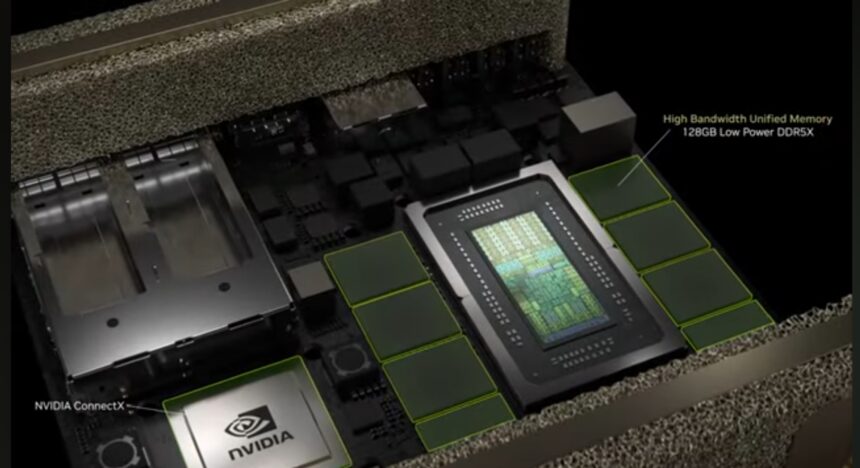NVIDIA Corporation, a global leader in semiconductors and AI technologies, is experiencing significant turbulence in the stock market. Over the past week, NVIDIA’s stock has seen a steep decline, with shares trading at $125.59 as of January 27, 2025, reflecting an 11.94% drop from the previous close. The sudden downturn has sparked concerns among investors and industry analysts, raising questions about the future of NVIDIA’s dominance in the rapidly evolving AI sector.
One of the primary catalysts for NVIDIA’s stock decline is the emergence of DeepSeek, a Chinese AI startup that has made headlines for its groundbreaking advancements. DeepSeek has developed a large-language AI model that rivals Western counterparts but at a fraction of the cost. Remarkably, DeepSeek built its model in just two months with an investment of under $6 million, compared to the hundreds of millions typically spent by U.S. firms. This achievement has raised alarm bells across the global tech industry. DeepSeek’s ability to produce high-performance AI models using significantly fewer resources challenges the established norms of AI development, which often rely on cutting-edge hardware, including NVIDIA’s GPUs. As a result, investors are questioning whether NVIDIA’s dominance in the AI hardware market is sustainable in the face of such cost-efficient alternatives.
NVIDIA’s stock plunge is not an isolated incident but part of a broader sell-off affecting the semiconductor sector. Companies like Broadcom and Super Micro have also experienced declines, underscoring the ripple effect of DeepSeek’s disruptive entry into the AI landscape. The concern is that if AI developers can achieve competitive results without relying heavily on high-end chips, the demand for NVIDIA’s GPUs and similar products may diminish over time. NVIDIA’s position as a leader in the AI hardware market has been built on the premise that its GPUs are essential for training and running large AI models. However, DeepSeek’s achievement suggests that software optimization and alternative approaches could reduce reliance on such hardware. This shift poses a significant challenge to NVIDIA’s business model, which is heavily reliant on the AI and data center markets.
The market reaction to these developments has been swift and severe. As NVIDIA’s stock fell, concerns about the broader implications for U.S. tech dominance in AI grew. Analysts have expressed mixed views on the situation. Some believe that the market is overreacting, arguing that NVIDIA’s technological expertise and established market presence will enable it to weather the storm. They point out that while DeepSeek’s achievement is impressive, it does not negate the importance of advanced hardware in many AI applications. NVIDIA’s GPUs remain the gold standard for tasks requiring high computational power, such as training complex neural networks. Others, however, warn that the emergence of cost-efficient competitors like DeepSeek could signal a paradigm shift in the AI industry. If software-based innovations continue to reduce the need for expensive hardware, companies like NVIDIA may need to rethink their strategies to maintain their competitive edge.
In response to these challenges, the U.S. government has announced a new initiative aimed at bolstering its AI sector. President Trump recently unveiled the Stargate Initiative, a $500 billion program designed to reinforce America’s leadership in AI and related technologies. The initiative includes investments in research and development, support for AI startups, and incentives for semiconductor companies to innovate and expand production. The Stargate Initiative reflects the growing recognition of AI as a critical area of national security and economic competitiveness. By investing in the industry, the U.S. hopes to counter the advancements of competitors like China and ensure that companies like NVIDIA continue to play a central role in the global AI ecosystem.
Despite the recent setbacks, NVIDIA remains a formidable player in the technology industry. The company’s GPUs are widely regarded as indispensable for a wide range of applications, from gaming and cloud computing to autonomous vehicles and scientific research. NVIDIA has also been a leader in developing software platforms that complement its hardware, such as the CUDA ecosystem, which is widely used by AI developers. To navigate the current challenges, NVIDIA may need to adopt a multi-pronged strategy that includes:
- Diversifying Product Offerings: Expanding beyond GPUs to include other types of hardware and software solutions that cater to emerging needs in the AI market.
- Collaborating with Innovators: Partnering with companies like DeepSeek to integrate cost-efficient AI models with NVIDIA’s hardware and software platforms.
- Investing in R&D: Accelerating research into next-generation technologies that can maintain NVIDIA’s competitive edge in a rapidly evolving landscape.
- Engaging in Policy Advocacy: Working with governments to shape policies that support the semiconductor industry and address unfair competition from foreign competitors.
The situation with NVIDIA and DeepSeek highlights the rapidly changing dynamics of the technology industry. The emergence of disruptive competitors can quickly reshape markets, forcing established players to adapt or risk losing relevance. This is particularly true in the AI sector, where advancements are occurring at an unprecedented pace. For the semiconductor industry, the rise of cost-efficient AI models presents both challenges and opportunities. On one hand, reduced reliance on high-end chips could dampen demand. On the other hand, innovations that make AI more accessible could expand the overall market, creating new opportunities for growth. The case of NVIDIA also underscores the importance of global cooperation and competition in driving technological progress. While the rise of companies like DeepSeek reflects the growing capabilities of nations like China, it also highlights the need for U.S. companies to remain agile and innovative to maintain their leadership.
NVIDIA’s recent stock decline is a reminder of the volatility and uncertainty inherent in the technology sector. While the emergence of competitors like DeepSeek poses significant challenges, it also underscores the dynamic nature of innovation and the opportunities that come with it. As NVIDIA adapts to the changing landscape, its ability to innovate, diversify, and collaborate will determine its success in the years ahead. At the same time, initiatives like the Stargate Initiative highlight the role of government policy in shaping the future of the AI industry.
For investors, the current turbulence in NVIDIA’s stock may be a cause for concern, but it also serves as a reminder of the importance of long-term perspectives in a rapidly evolving market. The story of NVIDIA and DeepSeek is not just about competition; it’s a testament to the transformative power of technology and the ever-shifting balance of global innovation. By navigating these challenges with resilience and vision, NVIDIA has the potential to remain at the forefront of the AI revolution, shaping the future of technology in ways that will resonate far beyond the present moment.






